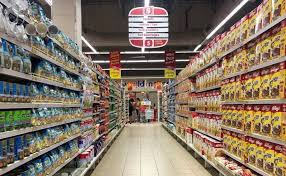Supermarkets and grocery stores across Nigeria are employing questionable tactics to stay afloat amid a struggling economy, often at the expense of both customers and workers. As shoppers navigate stores, they face the frustration of missing price tags and unexpected price hikes at the checkout, leading to feelings of exploitation and helplessness.

A visit to a busy grocery store reveals a common scenario: a shopper and an attendant arguing over the sudden increase in prices of goods. Despite the shopper’s frustrations, they often have no choice but to pay the new prices, as the lack of clear price labeling leaves them with little room for decision-making. This situation is not isolated, as many customers across the country experience similar issues.
Supermarket and grocery store owners justify these practices by pointing to the ongoing economic challenges. They argue that the fluctuating prices of goods force them to constantly adjust their pricing, often without updating the labels. However, this practice directly violates consumer protection laws that require clear price displays for all products.
The Federal Competition and Consumer Protection Act of 2018 mandates that supermarkets must display the prices of goods clearly and cannot charge more than the displayed price. Despite this, many stores either fail to label products or display outdated prices, leaving customers vulnerable to overcharging.
For workers, the situation is equally grim. Many supermarket operators have resorted to cutting wages and reducing staff numbers to manage costs. Employees, some earning as little as N30,000 per month, find themselves overworked and underpaid. The harsh reality is that despite working long hours, they struggle to make ends meet.
In Lagos and Ogun states, employees like Chinonye, a supermarket attendant, express their dissatisfaction with the low pay and the unfair treatment they receive. She relocated to Lagos in search of better opportunities, but her experience has been far from ideal. Her employer’s excuse for the low wages is the need to maintain the supermarket despite the poor economy, but this reasoning does little to alleviate her financial struggles.
Supermarket owners argue that the unstable economy leaves them with little choice but to make such sacrifices. They claim that frequent price changes in the market force them to sell goods at higher prices, even if this means neglecting their legal obligation to label products properly.
While some supermarkets have obtained loans to keep their businesses running, they often pass the financial burden onto their staff and customers. Experts warn that these short-term strategies are unsustainable and could lead to significant issues, such as decreased employee morale, high turnover rates, and poor customer service.
To address these challenges, experts suggest that supermarkets should focus on sustainable business practices, such as improving supply chain management, investing in technology, and implementing customer loyalty programs. Additionally, there is a need for stricter enforcement of consumer protection laws to ensure that shoppers are not exploited.
Ultimately, the situation calls for a balanced approach where supermarkets can survive without compromising the rights of their workers and customers. Only by adhering to ethical practices can these businesses hope to build long-term success and trust with the public.



